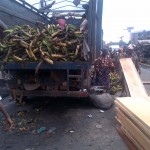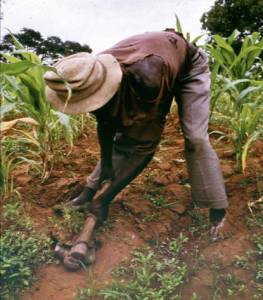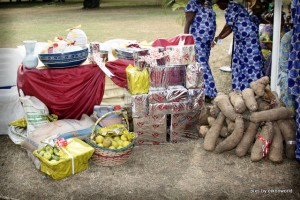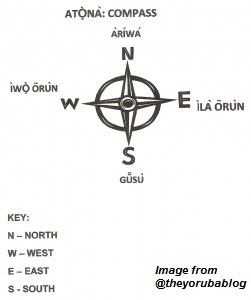Originally posted 2016-12-31 23:30:32. Republished by Blog Post Promoter
Ẹ káàbọ̀ si ọdún Ẹgbàálémẹ́tàdínlógún – Welcome to 2017
“Iṣẹ́ loògùn ìṣẹ́” – “Work is the antidote for destitution/poverty”
Orin fun Àgbẹ̀: Yoruba song encouraging farming:
Iṣẹ́ Àgbẹ̀ ni iṣẹ́ ilẹ̀ wa a, Farming is the job of our land
Ẹni kò ṣiṣẹ́, á mà jalè, He who fails to work, will steal
Ìwé kí kọ́, lai si ọkọ́ àti àdá Education without the hoe and cutlass (farm tools)
Kò ì pé o, kò ì pé o. Is incomplete, it is incomplete
Orin yi fi bi Yorùbá ti ka iṣẹ abínibí àkọ́kọ́ si hàn. Olùkọ́, a má kọ àwọn ọmọ ilé-iwé alakọbẹrẹ ni orin yi lati kọ wọn bi iṣẹ́-àgbẹ̀ ti ṣe kókó tó, nitori eyi, bi wọn ti nkọ́ iwé, ki wọn kọ́ iṣẹ́-àgbẹ̀ pẹ̀lú. “Olùpàṣẹ, ọ̀gá ninú Olórin Olóyè Ebenezer Obey” fi òwe Yorùbá ti ó sọ pé “Bi ebi bá kúrò ninú ìṣẹ́, ìṣẹ́ bùṣe” kọrin. Àgbẹ̀ ni ó npèsè oúnjẹ ti ará ilú njẹ àti ohun ọ̀gbin fún tità ni ilé àti si Òkè-òkun.
Owó Àgbẹ ni Nàíjíríà fi ja ogun-abẹ́lé fún ọdún mẹta lai yá owó ni bi ọdún mẹta-din-laadọta titi di ọdún mẹrin-le-logoji sẹhin. Lẹhin ogun-abẹ́le yi, Naijiria ri epo-rọ̀bì ni rẹpẹtẹ fún tita si Òkè-òkun. Dipò ki wọn fi owó epo-rọ̀bì yi pèsè ẹ̀rọ oko-igbálódé fún àwọn Àgbẹ̀ lati rọ́pò ọkọ́ àti àdá, ṣe ni wọn fi owó epo-rọ̀bì ra irà-kurà ẹrù àti oúnjẹ lati Ò̀kè-òkun wọ ilú. Eyi ló fa ifẹ́-kufẹ si oúnjẹ àti ohun ti ó bá ti Oke-okun bọ̀ titi di òni.
Gẹ́gẹ́ bi Ọba-olórin Sunny Ade ti kọ́ lórin pé “Kò si Àgbẹ̀ mọ́ lóko, ará oko ti dari wálé”. Gbogbo ará oko ti kúrò lóko wá si ilú nlá lati ṣe “iṣẹ́-oṣù tàbi iṣẹ́-Ìjọba” dipò iṣẹ́-àgbẹ̀. Owó iná-kuna yi sọ ọ̀pọ̀ di ọ̀lẹ nitori ó rọrùn lati ṣe iṣẹ́ oṣù ni ibòji ilé-iṣẹ́, lẹhin iwé-mẹfa tàbi iwé-mẹwa ju ki wọn ṣe iṣẹ́-àgbẹ̀ lọ.
Òwe Yorùbá ti ó ni “Iṣẹ́ loògùn ìṣẹ́” kò bá ohun ti o nṣẹ lẹ̀ ni ayé òde òni lọ. Ọ̀pọ̀lọpọ̀ òṣìṣẹ́-Ijọba tàbi oniṣẹ́-oṣù wà ninú ìṣẹ́, nitori wọn kò ri owó gbà déédé mọ, bẹni àwọn ti ó fẹhinti lẹ́nu iṣẹ́ kò ri owó-ifẹhinti gbà nitori Ìjọba Ológun, Òṣèlú àti Ọ̀gá ilé-iṣẹ́ ngba àbẹ̀tẹ́lẹ̀ wọn nja ilé-iṣẹ́ àti ilú ló olè nipa ki kó owó jẹ.
Oriṣiriṣi iṣẹ́-ọwọ́ àti òwò ló wà yàtọ̀ si iṣẹ́-àgbẹ̀. Ọ̀rọ̀ Yorùbá sọ pé, “Ọ̀nà kan kò wọ ọjà, ló mú telọ (aránṣọ) tó nta ẹ̀kọ”. Ohun ti oniṣẹ́-oṣù àti òṣiṣẹ́-Ìjọba lè ṣe lati lo iṣẹ́ fún oògùn ìṣẹ́ ni, ki wọn ni oko lẹgbẹ pẹ̀lú iṣẹ́-oṣù tàbi ki wọn kọ́ iṣẹ́-ọwọ́ miran ti wọn lè ṣe lẹhin ifẹhinti.
ENGLISH TRANSLATION
The above song reflect the value attached to Agriculture. Teachers, taught the Primary School pupils the song to teach them the awareness about the importance of farming, hence, as they are acquiring education they should learn about farming as well. Chief Commander Ebenezer Obey, a prominent Musician used the Yoruba adage that said “Lack of hunger reduces poverty drastically” in one of his albums. Farmers are the producer of the food being consumed by the city people and their farm produce are sold both at home and abroad.
Agricultural proceeds were spent to sustain the three years of the Nigerian Civil War without any external debt, between forty-seven and forty four years ago. After the Civil War, Nigeria discovered Crude Oil in commercial quantity for sale to buyers Oversea. Instead of using the proceed from Crude Oil sale to provide modern agricultural tools and machines to replace hoe and cutlass, Crude Oil proceeds were spent importing into the country all sorts of goods and food from Oversea. This led to the development of taste for foreign goods and food up till now.
According to one the prominent Musician, King Sunny Ade in his song that is translated thus “No more farmer in the farm, farmers have all returned home”. During the Oil boom, many farmers migrated from the farm to the large towns and cities in search of “salaried job or Government jobs” instead of farming. Squandering of the oil wealth has made many to become lazy as it is easier to work in cosy offices after Primary or Secondary education than being a farmer.
According to Yoruba proverb that said “Work is the antidote for destitution/poverty”, is no longer relevant to the happenings of nowadays. On the contrary, many Government workers and salaried employees are destitute or in poverty, as a result of irregular salary payment, also pensions are delayed for Retired employees because of treasury looting, embezzlement, corruption by the Military Government, Politicians and the office big boss.
There are various crafts and trades that can be learnt be side farming. One of the Yoruba adage said “Not only one road leads to the market, hence the diversification of the Tailor selling corn-meal”. In order for the salaried staff and Government workers to use work as medicine to avert poverty, they need to either cultivate a farm as an addition or acquire more skills that could be used during salaried job or after retirement.
Originally posted 2014-12-16 22:22:59. Republished by Blog Post Promoter
“Bi o kò bá lágbára ohun ti o fẹ́, ni ìfẹ́ ohun ti o ni”: “If you cannot afford what you want, then love what you have”
Ẹ kú ipalẹ̀mọ́ ọdún o. Bi ọdún bá sún mọ́ etílé, oúnjẹ àti ohun èlò gbogbo maa nwọn nitori àwọn ọlọ́jà yio ti fi owó kún ọjà nitori èrò ti ó fẹ́ ra ọjà maa n pọ̀ si ni àsikò yi. Pa pọ̀ mọ́ ipari ọdún ni àwọn ti ó fi ayẹyẹ iyàwó, òkú, ọdún Kérésìmesì àti ṣíṣe miràn si àsikò yi.
Kò si ẹni ti kò ni nkankan. Pé èniyàn ni ara li le tàbi ó lè jẹun, ó tó nkan. Ilẹ̀ Yorùbá ni ohun ọrọ̀ ajé àti oúnjẹ ni oriṣiriṣi tẹ́lẹ̀, ṣùgbọ́n lati igbà ti Ìjọba àpapọ̀ ti da gbogbo ẹ̀yà orilẹ̀ èdè Nigeria pọ̀ ti wọn si bẹ̀rẹ̀ si pin owó epo rọ̀bì ni ìfẹ́ oúnjẹ àti ọjà òkèèrè/òkè-òkun ti sọ ọ̀pọ̀lọpọ̀ di ọ̀lẹ àti ẹni ti kò ni ìrònú.

Oúnjẹ ilẹ̀ wa – Home grown food. Courtesy: @theyorubablog
Àsikò tó lati ṣe àyípadà, ki a jẹ ohun ti a ba gbin ni ilẹ̀ wa, nitori owó epo rọ̀bì ti gbogbo ilú gbójúlé ti fidi janlẹ̀. Ki owó epo rọ̀bì tó dé, a nfi ìrẹsì ṣe ọdún pàtàki fún àwọn ọmọdé, ṣùgbọ́n iresi ti wọn gbin ni ilẹ̀ wa ni a njẹ. Bi a ra oúnjẹ ilẹ̀ wa dipò oúnjẹ òkè-òkun, àgbẹ̀ yi o ri owó, a o si mọ irú oúnjẹ ti a njẹ ju ìrẹsì oníke ti wọn nkó wọ ilú.
Ki ṣe dandan ni ki a se ìrẹsì fún ọdún, a lè fi oúnjẹ ẹ̀yà miràn ṣe ọdún fún àwọn ọmọ. Fún àpẹrẹ, Ìjẹ̀bú lè se ọbẹ̀ ẹ̀fọ́ rirò àti iyán dipò ìkọ́kọrẹ́ fún ọdún tàbi ki Èkìtì se ìkọ́kọrẹ́ fún ọdún dipò iyán àti ẹ̀fọ́ rirò àti bẹ́ ẹ̀ bẹ́ ẹ̀ lọ. Ẹ jẹ́ ki a gbé oúnjẹ ilẹ̀ wa lárugẹ.
ENGLISH TRANSLATION
Season greetings. When the festive period is close by, marketers often raise the price of foodstuff and other goods in response to higher demand. In addition to the end of year celebration, people often celebrate marriages, burial, Christmas and other events at this period.
There is no one who can claim to have nothing. The fact that one has life and can eat, is something. In the past, Yoruba had a thriving commerce and various types of foodstuff, but since the Federal Government introduced the unitary system of government in place of regionalism, and began to share crude oil revenue, the love of foreign food and goods increased, people became lazier and could not think of ways of improving our own products.
It is now time for ‘change’ to begin consuming our home grown food, because the revenue from crude oil that the entire country is depending on has crashed. Before crude oil became the mainstay of the economy, rice was a meal prepared during festive season for the children, but it was home grown rice not imported. If we patronise our local food, then we would be sure of the kind of food being consumed, it will boost the income of local farmers and prevent importation of plastic rice.
It is not compulsory to cook rice during celebration, food from other ethnic groups can be prepared for the children to explore during the festive season. For example, Ijebu people can prepare vegetable and pounded yam instead of water yam pottage (ikokore), while Ekiti can cook water yam pottage (ikokore) instead of pounded yam and vegetable soup etc. Let us join hands to promote our foods.
Originally posted 2016-12-13 18:51:54. Republished by Blog Post Promoter
ORÚKỌ ỌJỌ́: Days of the Week in Yoruba
Below are the Yoruba days of the week. Of course it is worth noting that very few native Yoruba speakers use these words in conversation.
SUNDAY ÀÌKÚ
MONDAY AJÉ
TUESDAY ÌṢẸ́GUN
WEDNESDAY ỌJỌ́RÚ
THURSDAY ỌJỌ́BỌ̀
FRIDAY ẸTÌ
SATURDAY ÀBÁMẸ́TA
Originally posted 2013-03-19 22:33:05. Republished by Blog Post Promoter
“Orin ẹ̀kọ́ lati bọ̀wọ̀ fún òbí ni ilé-ìwé alakọbẹrẹ”: Primary School song to teach respect for parents
Orin yi ni Olùkọ́ ma fi ńkọ́ àwọn ọmọ ilé-ìwé alakọbẹrẹ nigbà “ilé-ìwé ọ̀fẹ́” ti àwọn Òṣèlú ilẹ̀ Yorùbá ti Olóyè Ọbáfẹ́mi Awólọ́wọ̀ ṣe olórí rẹ. Ni ayé ìgbà wọnyi, ọ̀pọ̀lọpọ̀ òbí a ma fi ebi panú, ṣiṣẹ́ kárakára tàbí ta ohun ìní lati pèsè fún àwọn ọmọ àti lati rán ọmọ lọ sí ilé-ìwé gíga. O yẹ ki ọmọ bọ̀wọ̀ fún irú àwọn òbí wọnyi.
MP3 Below
Download: Omo to moya iya loju – Respect for parents
Ọ́mọ tó mọ̀ yà rẹ lóju ò
Oṣí yo tá mọ náà pàa
Ọ́mọ tó mọ̀ bà rẹ lóju o
Oṣí yo tá mọ náà pàa
Iyà rẹ̀ jiyà pọ̀ lorí rẹ
Bàbà rẹ̀ jiya pọ̀ lorí rẹ
Ọ́mọ tó mọ̀ yà rẹ lóju ò
Oṣí yo tá mọ náà pàa
Ọ́mọ tó mọ̀ bà rẹ lóju o
Oṣí yo tá mọ náà pàa
ENGLISH TRANSLATION
During the “Free Education Programme in the Western State of Nigeria” that was created by the Politicians led by Chief Obafemi Awolowo, Primary School pupils are thought the song below to teach respect for parents. At that period, many parents denied themselves of food, worked hard or even sell their properties in order to provide for their children and to educate them in the Higher Institutions. It is only apt for such children to respect such parents.
The child that disobey his/her parent
Will suffer poverty in the end
The child that disobey his/her father
Will suffer poverty in the end
Your mother suffered so much for you
Your father suffered so much for you
A child that disobey his/her parent
Will suffer poverty in the end
A child that disobey his/her father
Will suffer poverty in the end
Originally posted 2013-07-26 20:21:43. Republished by Blog Post Promoter
Wi wé Gèlè Ìgbàlódé – How to tie Modern Head Scarfs
Originally posted 2015-07-07 19:41:40. Republished by Blog Post Promoter
Bi Irọ́ bá lọ fún Ogún Ọdún, Òtítọ á ba Lọ́jọ́ Kan – Ìbò Ọjọ́ Kejilá Oṣù Kẹfà Ọdún fún MKO Abiọ́lá Kò Gbé – Truth will always catch up lies – June 12 Election of Late Chief MKO Abiola is not in Vain
Lẹhin ọdún mẹẹdọgbọn ti Ijoba Ologun Ibrahim Babangida fagilé ìbò ti gbogbo ilú dì lai si ìjà tàbi asọ̀ tó gbé Olóògbé Olóyè Moshood Káṣìmáawòó Ọláwálé Abíọ́lá wọlé, Ìjọba Muhammadu Buhari sọ ọjọ́ kejilá oṣù kẹfà di “Ọjọ́ Ìsimi Ìjọba Alágbádá” fún gbogbo orílẹ̀-èdè Nigeria.
Ìjọba Ológun àti Ìjọba Alágbádá ti o ti ṣèlú́ lati ọdún mẹẹdọgbọn sẹhin rò wi pé ó ti pari, nitori wọn fẹ́ ki ọjọ́ yi di ohun ìgbàgbé, ṣùgbọ́n gẹ́gẹ́ bi ọ̀rọ̀ Yorùbá ti ó ni “Bi irọ́ bá lọ fún ogún ọdún, òtítọ́ á ba lọ́jọ́ kan”. Òtítọ́ ti bá irọ́ ọdún mẹẹdọgbọn ni ọjọ́ òní ọjọ́ kejila oṣù kẹfà, ọdún Ẹgbàáléméjìdínlógún. Olórí Òṣèlú Muhammadu Buhari dójú ti àwọn onírọ́ ti ó gbá gbogbo ẹni ti ó dìbò lójú.
Ki Ọlọrun kó dẹlẹ̀ fún Olóògbé Olóyè MKO Abíọ́lá, gbogbo àwọn ti ó kú lai ri àjọyọ̀ ọjọ́ òní.
ENGLISH TRANSLATION
Twenty-five years after a peaceful and fair election of late Chief MKO Abiola was annulled by the military Junta Ibrahim Babangida, the government of President Muhammadu Buhari declared “June 12 Democracy Day and National Public Holiday”.The previous military and democratic government in the last twenty-five years thought June 12 could be swept under the rug and will be a forgotten issue, but according to Yoruba adage “Even if takes twenty years for lies to thrive, the truth will catch up one day”. The truth has eventually catch up with the lies of twenty-five years on June 12, 2018. President Muhammadu Buhari has put the liars who deprived Nigerians of their mandate to shame.
May God grant Chief MKO Abiola and all who lost their lives as a result of a day like this eternal-rest.
Originally posted 2018-06-13 02:32:27. Republished by Blog Post Promoter
“Ìfura loògùn àgbà, àgbà ti kò sọnú, á sọnù”: “Suspicion is the medicine of the elder, an unthoughtful elder will be lost”
Ẹ̀kọ́ kíkọ́ ni ó lè fún àgbà ni ọgbọ́n àti òye lati lè sọnú. Oriṣiriṣi ọ̀nà ni a lè fi gbà kọ́ ẹ̀kọ́, ṣugbọn ni ayé òde òni, ohun gbogbo ni a lè ri kọ́ ni orí ayélujára.
Bi ayélujára ti sọ ayé di ẹ̀rọ̀ tó bẹ̃ ló tún bayé jẹ́ si. Àwọn ọmọ ìgbàlódé mọ èlò ẹ̀rọ ayélujára ju àgbàlagbà lọ. Àgbà ti kò bá ni ìfura, ki o si kọ ẹ̀kọ́ lilo ẹ̀rọ ayélujára á sọnù.
Ki ṣe orí ẹ̀rọ ayélujára nikan ni ó ti yẹ ki àgbà ma fura ki o ma ba sọnù. Àgbà ni lati ṣe akiyesi àwọn ohun wọnyi: ṣọ́ra fún àwọn Òṣèlú nipa ṣi ṣọ́ ìbò ti a di dáradára; owó ni ilé ifowó-pamọ́; wi wo àyíká fún amin ewu ti o le wa ni àyíká; ṣi ṣọ irú ounjẹ ti o yẹ ki a jẹ; àti bẹ̃bẹ̃ lọ.


A lè fi òwe Yorùbá ti ó ni “Ìfura loògùn àgbà, àgbà ti kò sọnú, á sọnù” yi ba gbogbo ọmọ Yorùbá (ọmọde àti àgbà) wi pé ki a fura, ki á si mã ronú jin lẹ̀ ki á tó ṣe ohunkohun. Àgbà, ẹ ṣọ́ra, ẹ ṣi ọkàn yin silẹ lati kọ ẹkọ nitori kò si ẹni ti o dàgbà lati kọ ẹ̀kọ́. Àgbà ti kò lè lo ẹ̀rọ ayélujára lè gbọ́ tàbi wo iṣẹlẹ ti o nlọ ni àyíká àti gbogbo àgbáyé lóri ẹ̀rọ Asọ̀rọ̀-má-gbèsì tàbi ẹ̀rọ Amuóhùn-máwòrán, lati kọ ọgbọ́n ti àgbà le fi sọnú, ki ó ma ba sọnù.
ENGLISH TRANSLATION
Learning or education is the source of knowledge and wisdom that would improve an elder’s thought. There are many ways of learning, but in the modern time, most things can be found on the internet.
It is not only on the internet that the elder should be suspicious or wary in order not to be lost. An elder must be observant about things such as: being watchful about the Politicians, by guiding their votes jealously; money in the bank; be watchful over the dangers that might be lurking around; the kind of food that is being eaten; etc.
The Yoruba proverb that said “Suspicion is the medicine of the elder, an unthoughtful elder will be lost”, can be used to instruct all the Yoruba people (both young and old) to be cautious, think deeply before embarking on any project.
Elders should be careful, open their minds for learning because no one is too old to learn. The elders that is unable to use the internet, can listen or watch past and current affairs on the Radio or Television. This will increase the elder’s awareness of happenings in the immediate environment and the whole world, thereby improving thoughts of avoiding being lost.
Originally posted 2014-12-09 10:30:49. Republished by Blog Post Promoter
Àjàpá rẹ Erin sílẹ̀ – “Ìjàlọ ò lè jà, ó lè bọ́ ṣòkòtò ni idi òmìrán”: The Tortoise humbled the Elephant – “Soldier ant cannot fight, but can cause the giant to remove pant”.
Erin jẹ ẹranko ti Ọlọrun da lọ́lá pẹlu titobi rẹ ninu igbo. Yorùbá ni “Koríko ti Erin bá ti tẹ̀, àtẹ̀gbé ni láyé”, oko ti Erin bá wọ̀, olóko bẹ wọ igbèsè tori ibajẹ ti o ma ṣẹlẹ̀ si irú oko bẹ. Gbogbo ẹranko bọ̀wọ̀ fún Erin, nitori Kìnìún ọlọ́là ijù kò lè pa Erin.
Bi Erin ti tóbi tó, ni ó gọ̀ tó. Ni ọjọ́ kan, gbogbo ẹranko pe ìpàdé lati pari ìjà fún Kọ̀lọ̀kọ̀lọ̀ àti Kìnìún. Kọ̀lọ̀kọ̀lọ̀ ni bi ohun ba pa ẹran, Kìnìún a fi ògbójú gba ẹran yi jẹ. Kàkà ki Erin da ẹjọ́ pẹ̀lú òye, ṣe ló tún dá kun. Ìhàlẹ̀ àti ìgbéraga ni àwùjọ yi bi awọn ẹranko yoku ninu. O bi Kọ̀lọ̀kọ̀lọ̀ ninu to bẹ gẹ ti kò lè fọhùn. Àjàpá nikan lo dide lati fún Erin ni èsì ọ̀rọ̀, ṣùgbọ́n gbogbo ẹranko yoku bú si ẹ̀rín nitori wọn fi ojú di Àjàpá. Dipo ki Àjàpá panumọ́, ó pe erin níjà.
Ni ọjọ́ ìjà, Erin kò múra nitori ó mọ̀ pé bi Àjàpá ti kéré tó, bi ohun bá gbé ẹsẹ̀ le, ọ̀run lèrọ̀. Àjàpa mọ̀ pé ohun ko ni agbára, nitori eyi, ó dá ọgbọ́n ti yio fi bá Erin jà lai di èrò ọ̀run. Àjàpá ti pèsè, agbè mẹta pẹlu ìgbẹ́, osùn àti ẹfun ti yio dà lé Erin lóri lati dójú ti. Ó tọ́jú awọn agbè yi si ori igi nitosi ibi ti wọn ti fẹ́ jà, ó mọ̀ pé pẹ̀lú ibinu erin á jà dé idi ibi ti yio dà le lori.
Awọn ẹranko péjọ lati wòran ijà lãrin Àjàpá àti Erin. Àjàpá mọ̀ pe bi erin bá subú kò lè dide, nigbati ti ijà bẹ̀rẹ̀, ẹhin ni Àjàpá wà ti o ti nsọ òkò ọ̀rọ̀ si erin lati dá inú bi. Pẹ̀lú ibinú, ki ó tó yípadà dé ibi ti Àjàpá wa, Àjàpá a ti kósi lábẹ́, eleyi dá awọn ẹranko lára yá.



Yorùbá ni “Bi ìyà nla ba gbeni ṣánlẹ̀, kékeré á gorí ẹni” ni ikẹhin, Àjàpá bori erin pẹ̀lú ọgbọ́n, gbogbo ẹranko gbé Àjàpá sókè pẹ̀lú ìdùnnú gun ori ibi ti erin wó si.
Ìtàn Yorùbá yi fihan pé kò si ẹni ti a lè fi ojú di. Ti a bá fẹ́ ka ìtàn yi ni ẹ̀kún rẹ́rẹ́ ni èdè Gẹẹsi, ẹ ṣe àyẹ̀wò rẹ ninu iwé “Yoruba Trickster Tales” ti Oyekan Owomoyela kọ.
ENGLISH TRANSLATION
The Elephant, was created by God with her giant status in the forest. As the Yoruba adage goes, “The grass trampled by the Elephant, is destroyed forever”. All animals respect the Elephant, because even a Lion, the king of the forest, cannot kill the Elephant on its own.
The Elephant is as foolish as her big size. One day, all animals gathered to settle a quarrel between the Tiger and the Lion. The Tiger accused the Lion of snatching the prey he had killed. Instead of the Elephant settling this quarrel with wisdom, she added more. Her boasting and pride angered the other animals. The Tiger was so angry that he became dumbfounded. Only the Tortoise got up to respond to the Elephant, but all the other animals busted into laughter because they under-rated the Tortoise. The Tortoise was undeterred but challenged the Elephant to a fight.
On the day of the fight, the Elephant was unprepared because she knew the Tortoise was so small that stamping on the Tortoise with one leg would result to an untimely death. Tortoise realized that she had no strength, hence, she invented the trick to confront the Elephant without ending up with untimely death. Tortoise prepared three gourds, filled with mixture of stool, the other with camwood (that is as red as blood) and the third with lime. He placed the gourds on the nearby trees closest to the venue of the fight, knowing fully that the Elephant out of rage would reach under the trees that would spill the concussion on her.
All the animals gathered to watch the fight between the Tortoise and the Elephant. Tortoise knew that once the Elephant falls, she cannot rise, so he began to taunt her to anger. In anger, before turning around to reach where the Tortoise was taunting, the Tortoise must have gone under her, this entertained the other animals.
According to the Yoruba saying, “When one is fell by small affliction, bigger ones will ride”, in the end, the Tortoise defeated the Elephant with wisdom, all the animals carried the Tortoise shoulder high with joy jumping on the Elephant where she fell.
Lessons from this story are one cannot underrate anyone, wisdom is mightier than might, boasting and pride brings shame etc. To read this story fully in English, check it in the book titled “Yoruba Trickster Tales” written by Oyekan Owomoyela.
Originally posted 2013-10-25 17:02:09. Republished by Blog Post Promoter
Ẹ̀YÀ ARA – ÈJÌKÁ DÉ ẸSẸ̀: PARTS OF THE BODY – SHOULDERS TO TOES
You can also download the mp3 by right clicking here: Parts of the body in Yoruba – shoulders to toes (mp3)
| Ẹ̀YÀ ARA | PARTS OF THE BODY |
| Èjìká | Shoulder |
| Abíyá | Armpit |
| Apá | Arms |
| Ìgunpá | Elbow |
| Ọrùnọwọ́ | Wrist |
| Ọwọ́ | Hand |
| Ìkaọwọ́ | Fingers |
| Ẽkanna | Nails |
| Àtẹlẹwọ | Palm of the hand |
| Atampako | Thumb |
| Àyà | Chest |
| Ọyàn | Breast/Bust |
| Ẹ̀gbẹ́ | Side |
| Ẹ̀hìn | Back |
| Ikùn | Stomach |
| Ìdodo | Navel or Belly button |
| Ìbàdí | Lower back |
| Ìdí | Butttocks |
| Ẹsẹ̀ | Legs |
| Ẽkún | Knee |
| Ọrùnẹsẹ̀ | Ankle |
| Ẹsẹ̀ | Legs |
| Àtẹ́lẹsẹ̀ | Sole of the foot |
| Ìkaẹsẹ̀ | Toes |
Originally posted 2013-04-23 21:34:14. Republished by Blog Post Promoter
ẸRÙ FÚN ÌDÍLÉ ÌYÀWÓ – LIST FOR BRIDE’S FAMILY – Apá Kẹta – Part Three
Ìyàtọ̀ diẹ̀ ló wà lãrin awọn ẹru igbéyàwó ti a kọ́ si ojú iwé yi lati idile si idile. Fún àpẹre: idile miran fẹ odidi iti ọ̀gẹ̀dẹ̀, nigbati àwọn idile miran lè bẽre fún àpò gãri. Kò si àyè àti sin abo ewúrẹ́ fún awọn ti o ńgbé ìlú nla tàbi ìlú òyinbó́, nitorina a lè fi owó dipò fún ìyá àgbà ni abúlé ki wọn ra abo ewúrẹ́ lati sin fún ìyàwó. Awọn ẹlẹ́sìn ìgbàlódé lè sọ wipé awọn ò fẹ́ ki wọn fi ataare àti obì ṣe àdúrà fún ọkọ ati ìyàwó. A tún ṣe akiyesi wipé wọn ki tú àpóti ìyàwó mọ, nitori ni ayé àtijọ́, wọn yio ṣi àpóti ki gbogbo ẹbí ri awọn ohun ẹ̀ṣọ́ ti ọkọ ìyàwó ra fún ìyàwó rẹ, eyi bo àṣírí ìnáwó lori awọn ohun ẹṣọ. Ẹbi tún lè wo ṣe fún ọkọ ìyàwó lati gba idaji oye iṣu tàbi ẹrù lati bo ni àṣiri.
ENGLISH TRANSLATION
There is just a little difference between the bridal list items and the family list from one family to the other. For example: some family would request for bunch of plantain, while the other would request for a bag of coarse cassava flour instead. There is no place to rear a she-goat for those living in the big city or living abroad, hence money can be given to bride’s grandmother or aunt to rear one in the village on her behalf. Also, those practising modern religion may not want alligator pepper and Cola-nut to pray for the bride and groom. It is also observed that, the practice of opening the bridal box to show off beautiful items bought by the groom in the presence of the family has been discontinued. The family can also be considerate to the groom by receiving half of the items on the list or less.




| ẸRÙ FÚN ÌDÍLÉ ÌYÀWÓ – LIST FOR BRIDE’S FAMILY | |||||||
| YORÙBÁ | ENGLISH | IYE | Quantity | D́IPÒ | SUBSTITUTE | ||
| Iṣu | Yam | Mejilogoji | 42 | Ọ̀dùnkún | 2 Bags of Potatoes | ||
| Obì | Kolanut | Mejilogoji | 42 | Èso àrọ́wọ́ tó | Available Fruits | ||
| Orógbó | Bitter Kola | Mejilogoji | 42 | Èso àrọ́wọ́ tó | Available Fruits | ||
| Atare | Alligator Pepper | Mọkanlelogun | 21 | ||||
| Abọ́ Aadun | Fried Corn Paste | Abọ́ Kan | 1 dish | ||||
| Iyọ̀ | Salt | Àpò Kan | I Bag | ||||
| Epo Pupa | Palm Oil | Garawa Kan | 1 Tin | Garawa Ò̀̀̀̀̀róró | 1 Tin of Vegetable Oil | ||
| Oriṣiriṣi Èso | Assorted Fruits | Àpẹrẹ Meji | 2 Baskets | Èso àrọ́wọ́ tó | Available Fruits | ||
| Oyin | Honey | Ìgo Meji | 2 Bottles | ||||
| Ìrèké | Sugar Cane | Igi Ìrèké Meji | 2 sticks of Sugar Cane | ||||
| Iyọ̀ Ìrèké oni horo | Sugar Cubes | Pálí Mẹwa Meji | 2 Packets of 10 | ||||
| Abo Ewúrẹ́ | She Goat | Ẹyọ Kan | 1 | Owó | Money | ||
| Ẹja gbigbẹ | Dry Fish | Mẹfa | 6 | Could be more | |||
| Ìrẹsi | Rice | Àpò Kan | 1 Bag | ||||
| Ìgò Ẹlẹsọ fún ọti | Decanter | Ìgò Meji | |||||
| Ẹmu | Palm Wine | Agbè Meji | Ẹmu-òyinbó | Champagne | |||
| Oriṣiriṣi ọti oyinbo | Assorted Drinks – Alchoholic & Non Alchoholic | Páli Merin | |||||
Originally posted 2013-10-29 20:54:27. Republished by Blog Post Promoter
Àwòrán ati Orúkọ àwọn Ẹiyẹ ni èdè Yorùbá – Pictures and names of Birds in Youruba
Àmì – Yoruba Accent
Àmì – ṣe pàtàkì ni èdè Yorùbá nitori lai si àmì, àṣìwí tàbi àṣìsọ á pọ̀. Ọ̀rọ̀ kan ni èdè Yorùbá lè ni itumọ rẹpẹtẹ, lai si àmì yio ṣòro lati mọ ìyàtọ. Àmì jẹ ki èdè Yorùbá rọrùn lati ka.
Èdè Yorùbá dùn bi orin. Àwọn àmì mẹta wọnyi – ̀ – do, re, ́ – mi, (ko si ~ – àmì fàágùn mọ). Ori àwọn ọ̀rọ̀ ti a lè fi àmì si – A a, Ee, Ẹẹ, Ii, Oo, Ọọ, Uu. Ọ̀rọ̀ “i” kò ni àṣìpè nitori èyi a lè ma fi àmì si ni igbà miràn.
À̀pẹrẹ pọ, ẹ ṣe àyẹ̀wò àpẹrẹ li lo àmì lóri àwọn ọ̀rọ̀ wọnyi:
ENGLISH TRANSLATION
Accent signs on words are very important in Yoruba language, because without it, there would be many mis-pronunciation. The same word in Yoruba language could have several meaning and knowing the difference could be difficult without the accent sign. Accent sign on words makes reading Yoruba easier.
Yoruba language is as sweet as singing. The three accent signs sounding as “two signs and one flat” (word-elongation sign has been eradicated). Accent signs can only be applied to these vowels a e, I,o,u. Sometimes accent sign is not applied on letter “I” because the prononciation is constant.
There are many examples, check out some of these examples in Alphabetical order:
Originally posted 2019-02-10 03:12:41. Republished by Blog Post Promoter
“Igbà kan nlọ, igbà kan nbọ̀, igbà kan kò dúró titi” – “Time passes by and does not wait forever”
Oriṣi mẹta ni Yorùbá ka igbà ẹ̀dá si. Gẹ́gẹ́ bi àgbà ninú Olórin ilẹ̀ Aláwọ̀dúdú Olóyè Ebenezer Obey (Fabiyi) ti kọ́ pé “Igbà mẹta ni igbà ẹ̀dá láyé, igbà òwúrọ̀, igbà ọ̀sán, igbà alẹ́, ki alẹ́ san wá ju òwúrọ̀ lọ”. Igbà meji ló wà fún ojú ọjọ́ – igbà òjò àti ẹ̀rùn.
Òjò ti fẹ́rẹ̀ kásẹ̀ kúrò ni ilẹ̀ ni oṣù kẹsan ọdún nitori àsikò ìkórè sún mọ́lé lẹhin òjò. Gẹgẹ bi ọ̀rọ̀ Yorùbá ti ó sọ pé “Igba …” ó yẹ ki enia kọ lati lo àsikò dáradára, nitori igbà kò dúró de ẹni kan. Kò yẹ ki enia fi àkókò ṣòfò, nitori ẹni kò gbin nkan, kò ni ẹ̀tọ́ àti kórè ni igbà ikórè. Ọ̀rọ̀ yi ṣe rán ẹni ti ó bá nfi àárọ̀ ṣeré leti pé bi igbà bá ti lọ, kò ṣe rà padà.
ENGLISH LANGUAGE
Yoruba belief groups a human’s time into three groups. One of the songs of the prominent African musician, Chief Ebenezer Obey (Fabiyi) reiterates this belief in his music. Spelling out the times into morning, afternoon and evening, and praying that the evening will be better than the morning. There are however, two seasons namely – rainy and dry Seasons.
The rainy season is almost over in the month of September as the harvest season is near after the rain. According to the Yoruba adage “Time passes bye and it does not wait forever”, people should learn to use time well, because time waits for no one. It is not wise to waste time, because whoever does not sow, does not deserve to reap during harvest season. It is apt to use this adage to remind the lazy one wasting his/her youth that once time is lost it cannot be redeemed.
Originally posted 2015-09-01 20:07:32. Republished by Blog Post Promoter
ATỌ́NÀ LÉDÈ YORÙBÁ – Cardinal Directions in Yoruba
Originally posted 2013-04-16 19:01:07. Republished by Blog Post Promoter
“Ni Ayé òde òni, njẹ́ ó yẹ ki a pọ́n Àṣà fi fẹ́ Iyàwó púpọ̀ lé ni Igbéyàwó Ìbílẹ̀ Yorùbá?” – “In Modern times, should Polygamy be encouraged in Yoruba Traditional Marriage?”
Ni igbà àtijọ́, oníyàwó kan kò wọ́pọ̀ nitori iṣẹ́ Àgbẹ̀. Àṣà fi fẹ́ iyàwó púpọ̀ ṣe kókó nitori bibi ọmọ púpọ̀ pàtàki ọmọ ọkùnrin fún irànlọ́wọ́ iṣẹ́-oko. Fi fẹ̀ iyàwó púpọ̀ kò pin si ilẹ̀ Yorùbá tàbi ilẹ̀ Aláwọ̀dúdú nikan, ó wọ́pọ̀ ni ilẹ̀ Aláwọ̀funfun ni ọ̀pọ̀lọpọ̀ ọdún sẹhin ṣùgbọ́n nitori òwò ẹrú àti ẹ̀sin igbàgbọ́ wọn bẹ̀rẹ̀ àṣà fi fẹ iyàwó kan. Lẹhin òwò ẹrú, li lo ẹ̀rọ igbàlódé fún iṣẹ́ oko jẹ ki Aláwọ̀funfun lè dúró pẹ̀lú àṣà fi fẹ́ iyàwó kan.
Ọ̀pọ̀lọpọ̀ ọ̀dọ́ ayé òde òni ti kọ àṣà fi fẹ́ iyàwó púpọ̀ silẹ̀ nitori ẹ̀sìn, ìmọ̀ àti si sá fún rògbòdiyàn ti ó lọ pẹ̀lú iyàwó púpọ̀. Iṣẹ́ Alákọ̀wé kò ṣe fi jogún fún ọmọ nitori iwé-ẹ̀ri àti ipò ti èniyàn dé ni iṣẹ́ Akọ̀wé tàbi iṣẹ́ Ìjọba kò ṣe fi jogún fún ọmọ bi oko. Owó ti ọ̀pọ̀lọpọ̀ Oniṣẹ́-oṣ̀u ngba kò tó lati bọ́ iyàwó kan ki owó oṣù míràn tó wọlé, bẹni kò tó gba ilé nla ti ó lè gba iyàwó púpọ̀ pàtàki ni ilú nla bi Èkó. Àṣà iyàwó púpọ̀ ṣi pọ̀, ni àwọn ilú kékeré tàbi Abúlé laarin àwọn àgbẹ̀ àti àwọn ti kò kàwé.
 Yorùbá ni “Bàbá, bàbá gbogbo ayé”, bi iyàwó kò bá ni iṣẹ́ lati tọ́jú ọmọ wọn, ìṣẹ́ dé, nitori eyi, ọ̀pọ̀lọpọ̀ obinrin Yorùbá ma ntẹpá mọ́ṣẹ́ lati lè tọ́jú ọmọ wọn lai dúró de ọkọ. Ìyà àti ìṣẹ́ ni fún ọmọ púpọ̀ àti àwon iyàwó ọkùnrin ti kò ni iṣẹ́ tàbi eyi ti ó ni iṣẹ́ ti kò wúlò.
Yorùbá ni “Bàbá, bàbá gbogbo ayé”, bi iyàwó kò bá ni iṣẹ́ lati tọ́jú ọmọ wọn, ìṣẹ́ dé, nitori eyi, ọ̀pọ̀lọpọ̀ obinrin Yorùbá ma ntẹpá mọ́ṣẹ́ lati lè tọ́jú ọmọ wọn lai dúró de ọkọ. Ìyà àti ìṣẹ́ ni fún ọmọ púpọ̀ àti àwon iyàwó ọkùnrin ti kò ni iṣẹ́ tàbi eyi ti ó ni iṣẹ́ ti kò wúlò.
Ewu ti ó wà ni ilé oníyàwó púpọ̀ ju ire ibẹ̀ lọ. Yorùbá ni “Oníyàwó kan kò mọ ẹjọ́ oníyàwó púpọ̀ da a”. Lára ewu wọnyi ni, ki i si ifọ̀kànbalẹ̀ nitori ijà àti ariwo ti owú ji jẹ laarin àwọn iyàwó ma nfà pàtàki ni agbo ilé nlá tàbi ilé Ọlọ́rọ̀ àti Olóyè. Ọ̀pọ̀lọpọ̀ ilé oníyàwó púpọ̀ ma nda ahoro lẹhin ikú Olóri ilé nitori kò si ẹni ti ó ni ìfẹ́ tọ si Bàbá oníyàwó púpọ̀.
ENGLISH TRANSLATION
In the olden days, monogamy was not common because of the Agrarian Community. Polygamy culture was important in order to produce many children particularly male children for the purpose of helping in the farm. Polygamy was not limited to the Yoruba culture or Africa, as it was common in the Western world many years ago, but slave trade and adopting Christianity made monogamy possible. After slave trade, invention of farming tools during the industrial age made it easier for the developed world to continue with monogamy.
Many modern youths/young men had rejected polygamy as a result of adopting Christianity, education and avoiding the turmoil associated with polygamy. Children cannot replace their parent’s position in a Blue collar job or use their certificates. Wage/Salaried Workers or Government Employment cannot be inherited as farm land could. The salary that is earned by many workers is not enough to feed a wife before the payment of the next, and cannot also be used to rent a big enough accommodation for many wives particularly in Cities like Lagos. Polygamy is still common in in the smaller towns or villages among farmers and the illiterates.
According to a Yoruba adage, “Father of all”, poverty comes, if a woman in Polygamy has no income to look after her own children. Many Yoruba women work very hard to take care of their children without waiting for the man. Children and wives of a jobless or working irresponsible Polygamist often suffer.
The disadvantage of Polygamy is more than its benefits. Another Yoruba adage said “A Monogamist cannot adjudicate in a Polygamist problem”. Some of the dangers of Polygamy are: lack of peaceful environment as a result of infighting and noise associated with rivalry among the wives particularly in a big compound of the wealthy and Chief’s home. Many Polygamous homes do crumble after the death of the head of the family because no one is committed to a Polygamous father.
Originally posted 2015-07-24 22:19:43. Republished by Blog Post Promoter
“ỌMỌ ÌYÁ́ MEJI KI RÉWÈLÈ”: 2 Siblings of the Same Mother Should not Die in the Same Tragedy #Watertown #Boston

Omo iya meeji okin ka abamo: Chechen legal permanent resident brothers terrorist suspects in Boston marathon bombing. Image is from the WHDH stream.
“Ọmọ ìyá meji ki réwèlè, Yorùbá ma nlo ọ̀rọ̀ yi nígbàtí ọmọ ìyá meji ba ko àgbákó tó la ikú lọ. Irú ìsẹ̀lẹ̀ tó kó ìpayà ba gbogbo ènìà bayi ki ṣe ijamba lásán ṣù́gbọ́n àwọn ìyá meji: Tsarnev, ni wọn tọ́ka si fún iṣẹ́ ibi tó ṣẹlẹ̀ ni oṣù kẹrin ọjọ kẹdogun nibi ere ọlọnajijin tí wọn sá ni Boston.
Ìṣẹ̀lẹ̀ yi ṣeni lãnu ṣùgbọ́n lati dáwọ́ ikú dúró, nítorí Ọlọrun, ó yẹ kí àbúrò fi ara han lati ṣe àlàyé ara rẹ̀.
English translation:
Yoruba people have a saying that siblings from the same mother should not land themselves in the same regretful situation. This is a saying I have heard used by elders when for instance siblings end up dead from a similar accident. Terrorism is by no means an accident, but the Tsarnev brothers who have been identified by Boston local news as the Terrorists responsible for the April 15 Boston Marathon bombing, should heed to this saying. The brothers are already stuck in a regretful situation but the younger brother can prevent the situation from getting worse.
This whole spectacle is sad enough as it is. But for the love of God I hope the younger brother chooses not to die and surrenders to explain himself.
Check out the following links to follow this story:
1. Local Boston News Live Stream
2. AP News Update
Originally posted 2013-04-19 11:31:36. Republished by Blog Post Promoter
“Òjò nrọ̀, Orò nké, atọ́kùn àlùgbè ti ò láṣọ méji a sùn ihòhò – Owó epo rọ̀bì fọ́”: “The rain is falling and the call of the secret cult is sounding loudly outside, the shuttle that lacks a change of clothing will sleep naked – Crude Oil price crashed”
Ìgbà tàbi àsikò mèji ló wà ni ọ̀pọ̀ ilẹ̀ aláwọ̀-dúdú, ìgbà òjò àti ẹ̀rùn. Ni ayé àtijọ́, òjò ni ará ilú gbójúlé lati pọn omi silẹ̀ fún ọ̀gbẹlẹ̀. Àsikò òjò ṣe pàtàki fún iṣẹ́-àgbẹ̀, omi pi pọn pamọ́ fún li lò, àti fún ìtura lọ́wọ́ ooru.
A lè fi ìgbà òjò wé ìgbà ti orilẹ̀ èdè Nigeria pa owó rẹpẹtẹ lori epo rọ̀bì lai fi owó pamọ́. Lati ìgbà ti epo rọ̀bì ti gbòde, ilú ko kọ ara si iṣẹ́ àgbẹ̀ àti àwọn iṣẹ́ miran ti ó lè pa owó wọlé. Àwọn Ìjọba Ológun àti Alágbádá, bẹ̀rẹ̀ si ná owó bi ẹni pé ìgbà ẹ̀rùn kò ni dé. Àbẹ̀tẹ́lẹ̀ gbigbà àti ji jà ilú ni olè, kò jẹ ki òjò owó epo rọ̀bì rọ̀ kári. Pẹ̀lú gbogbo owó epo rọ̀bì rẹpẹtẹ, iwà ibàjẹ́ pọ̀ si, kò si ọ̀nà ti ó dára, ilé-iwé bàjẹ́ si, ilé-iwòsàn kò ni ẹ̀rọ igbàlódé, ilú wà ni òkùnkùn nitori dákú-dáji iná-mọ̀nàmọ́ná àti ìnira yoku.
Òwe Yorùbá sọ wipé “Òjò nrọ̀, Orò nké, atọ́kùn àlùgbè ti ò láṣọ méji a sùn ihòho” Ìtumọ̀ òwe yi ni pé “Ẹni ti kò bá pọn omi de òùngbẹ nigbà òjò , a jẹ ìyà rẹ ni ìgbà ẹ̀rùn”. A lè fi òwe yi ṣe ikilọ fún àwọn Òṣèlú Alágbádá ti ó nkéde fún ibò ni lọ́wọ́lọ́wọ́ pé àtúnṣe ṣi wà lati rán aṣọ kọjá méji fún ará ilú. Ni àsikò ẹ̀rùn ti owó epo rọ̀bì fọ́ yi, ó yẹ ki àwọn Òṣèlú lè ronú ohun ti wọn lè ṣe lati yi ìwà padà kúrò ni inákuná àti lati ronú ohun ti wọn lè ṣe lati pa owó wọlé kún owó epo rọ̀bì, ki ilú lè rọgbọ lọ́jọ́ iwájú.
ENGLISH TRANSLATION
There are two main seasons in most African Countries, rain and dry season. In the olden days, people depended mostly on the rain in order to fetch and store water for the dry season. Raining season is very crucial for farming, storage of water for subsequent use and cooling off the heat.
Raining season can be compared with when Nigeria made a lot of revenue from Crude Oil without saving. Since the discovery of Crude Oil in commercial quantity, farming and other skilful jobs that could have contributed to the national revenue has been neglected. Both the military and democratic government began to squander the revenue as if there will never be dry season such as the crude oil price crash. Corruption and public fund looting did not allow the rainfall of crude oil revenue reach the populace. Despite the huge crude oil revenue, indiscipline increased, no good road, schools became dilapidated, hospitals lacked modern equipment and the country remained in darkness as a result of the constant power outage and other problems.
Yoruba proverb said “The rain is falling and the call of the secret cult is sounding loudly outside, the shuttle that lacks a change of clothing will sleep naked”. This means, “If one does not make provision during the raining season, one is bound to suffer hardship during the dry season”. This proverb can be used to caution the politicians that are currently canvassing for the peoples’ votes that there is still room for improvement to increase the number of the people’s clothing. As it is now the dry season, caused by the crude oil price crash, it is apt for the politicians to think of the strategies of changing the attitude of squandering public funds and come up with ideas of increasing revenue from other sources in addition to the crude oil revenue so as to secure the future.
Originally posted 2015-02-06 09:30:04. Republished by Blog Post Promoter
“Ọ̀run ńyabọ̀, ki ṣé ọ̀rọ̀ ẹnìkan”: “The sky is falling, is not a matter limited to a person”.
Òwe Yorùbá yi ṣe gba àwọn ti o nbẹ̀rù nigba gbogbo níyànjú wípé ó yẹ ki èniyàn fara balẹ̀ lati ṣe iwadi ohun ti ó fẹ́ ṣẹlẹ̀ ki ó tó “kú sílẹ̀ de ikú”.
Ẹlòmíràn, kò ni ṣe iwadi ohun ti àwọn èniyàn fi ńsáré, ki ó tó bẹ̀rẹ̀ si sáré. Ọpọlọpọ ti sa wọ inú ewu ti wọn rò wípé àwọn sá fún. Fún àpẹrẹ, nigbati iná ajónirun balẹ̀ ni àgọ́ Ológun ni Ikẹja ni ìlú Èkó ni bi ọdún mẹjọ sẹhin. Bi àwọn kan ti gbọ́ ìró iná ajónirun yi, wọn sáré titi ọpọ fi parun si inú irà ni Ejigbo ni ọ̀nà jínjìn si ibi ti ìṣẹ̀lẹ̀ ti ṣẹlẹ̀.
Àpẹrẹ miran ti a lè fi ṣe àlàyé pé “Ọ̀run ńyabọ̀, ki ṣé ọ̀rọ̀ ẹnìkan” ni ẹni ti ó sọ pé ohun ri wípé ayé ti fẹ parẹ́, àwọn kan gbàgbọ́, wọn bẹ̀rẹ̀ si ta ohun ìní wọn. Àti ẹni ti ó ta ohun ìní àti ẹni ti ó ra, kò si ninú wọn ti ó ma mú nkankan lọ ti ayé bá parẹ nitotọ.
ENGLISH TRANSLATION
This Yoruba proverb can be used to encourage those who are always afraid, that it is good to be patient enough to find out the happenings before “dying in readiness for death”.
Some, will not enquire about why people are running before they begin to run too. Many have ran into danger that they thought they were trying to escape. An example, was when there was bomb explosion at the Ikeja Cantonment, Lagos about eight years ago. When some heard the explosion, they ran until they perished at the Ejigbo marsh, a far distance from the incident.
Another example that can be used to buttress the proverb that “The sky is falling, is not a matter limited to a person”, was when a soothsayer predicted that the world was coming to an end at the beginning of the new millennium, many believed and they began to sell off their properties. Both the property seller and the property buyer, none would take along anything were the world to have come to an end as predicted.
Originally posted 2013-09-27 18:37:30. Republished by Blog Post Promoter
“Ọ̀dájú ló bi owó, ìtìjú ló bi igbèsè”: “Shrewdness gives birth to money while shyness gives birth to debt”.
Gẹ́gẹ́bí ọ̀rọ̀ Yorùbá ti ó ni “Iṣẹ́ ni oogun ìṣẹ́”, jẹ́ òtítọ́, bi òṣìṣẹ́ bá ri owó gbà ni àsìkò, tàbi gba ojú owó fún iṣẹ́ ti wọn ṣe. Òṣìṣẹ́ ti ó ṣiṣẹ́ fún ọ̀pọ̀lọpọ̀ wákàtí/àkókò lórí owó kékeré, kò lè bọ́ ninu ìṣẹ́, nitori, ọlọ́rọ̀ kò ni ìtìjú lati jẹ òógùn Òṣìṣẹ́. Ọ̀pọ̀ òṣìṣẹ́, a fi ìtìjú gé ara wọn kúrú nipa àti bèrè ẹ̀tọ́ wọn. Òṣìṣẹ́ míràn a ṣe iṣẹ́ ọ̀fẹ́ fún ọlọ́rọ̀ tàbi ki wọn fúnra wọn gé owó ise wọn kúru lati ri ojú rere ọlọ́rọ̀, nipa èyi, wọn á pa owó fún ọlọ́rọ̀ ni ìparí ọdún.
Ọ̀rọ̀ Yorùbá ti o ni “Ọ̀dájú ló bi owó, ìtìjú ló bi igbèsè” ṣe ló lati ba oloro tàbi o ni ilé-iṣẹ́ ti á lo gbobo ọ̀nà lati ma gba “Ẹgbẹ́-òṣìṣẹ́” láyè. Ọlọ́rọ̀ kò ni ìtìjú lati lo òṣìṣẹ́ fún owó kékeré. A lè lo ọ̀rọ̀ yi lati gba Òṣìṣẹ́ ni ìyànjú ki wọn má tara wọn ni ọ̀pọ̀, nipa bi bèrè owó ti ó yẹ fún iṣẹ́ ti wọn ṣe àti pé ki òṣìṣẹ́ gbìyànju lati kọ iṣẹ́ mọ́ iṣẹ́ lati wà ni ipò àti bèrè ojú owó.
ENGLISH TRANSLATION
According to the Yoruba adage that said “Work is the antidote against poverty”, can be true if workers are paid timely a fair/living wage. A worker that works several hours to make ends meet on low wages cannot be said to be out of poverty. While the rich are shameless about exploiting the employees, some employees are shy of demanding for the right wage. Some would undercut themselves by working extra hours without the commensurate pay in order to please their employer who declares so much profit at the end of the year.
The Yoruba adage that is literarily translated as “Shrewdness gives birth to money/wealth and shyness gives birth to debt” is apt in addressing the rich or company owner who will do everything to deprive the employees the freedom of association such as joining “Workers Union”. Employers have no shame in undercutting the employees. It can also be used to enlighten the employees not to undercut themselves by negotiating the right wage and also to take advantage of improving their skills to give them better chance of negotiating.
Originally posted 2013-09-03 17:35:06. Republished by Blog Post Promoter




